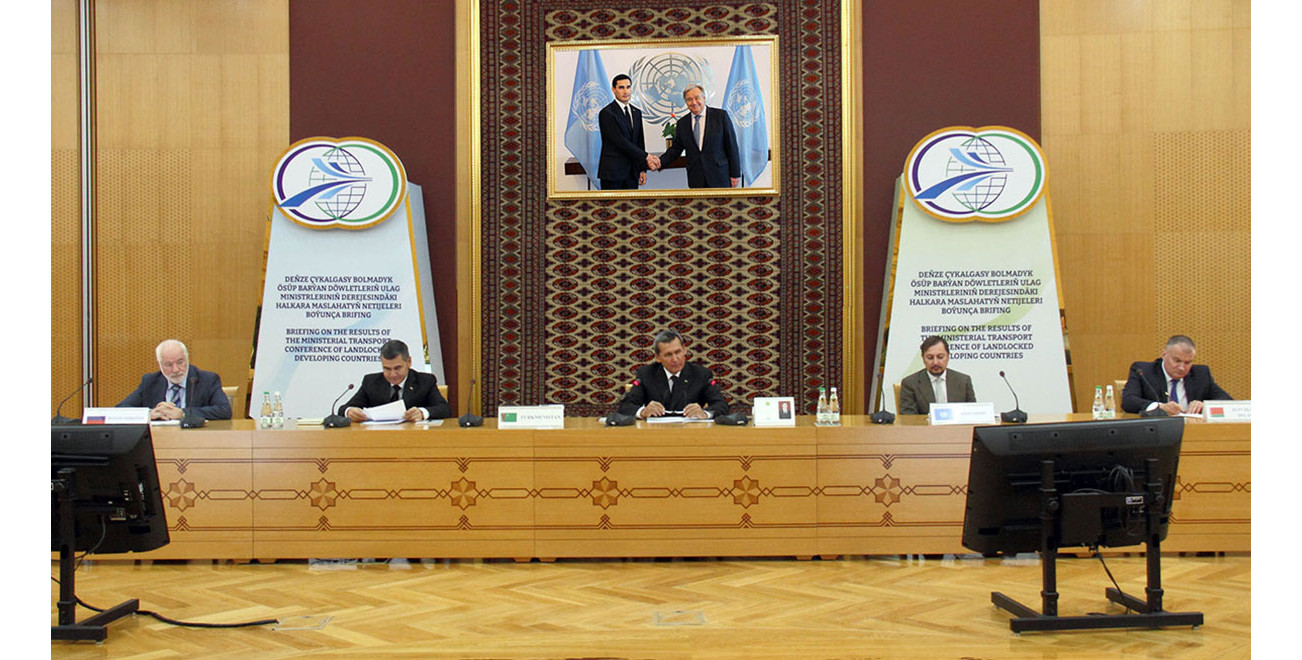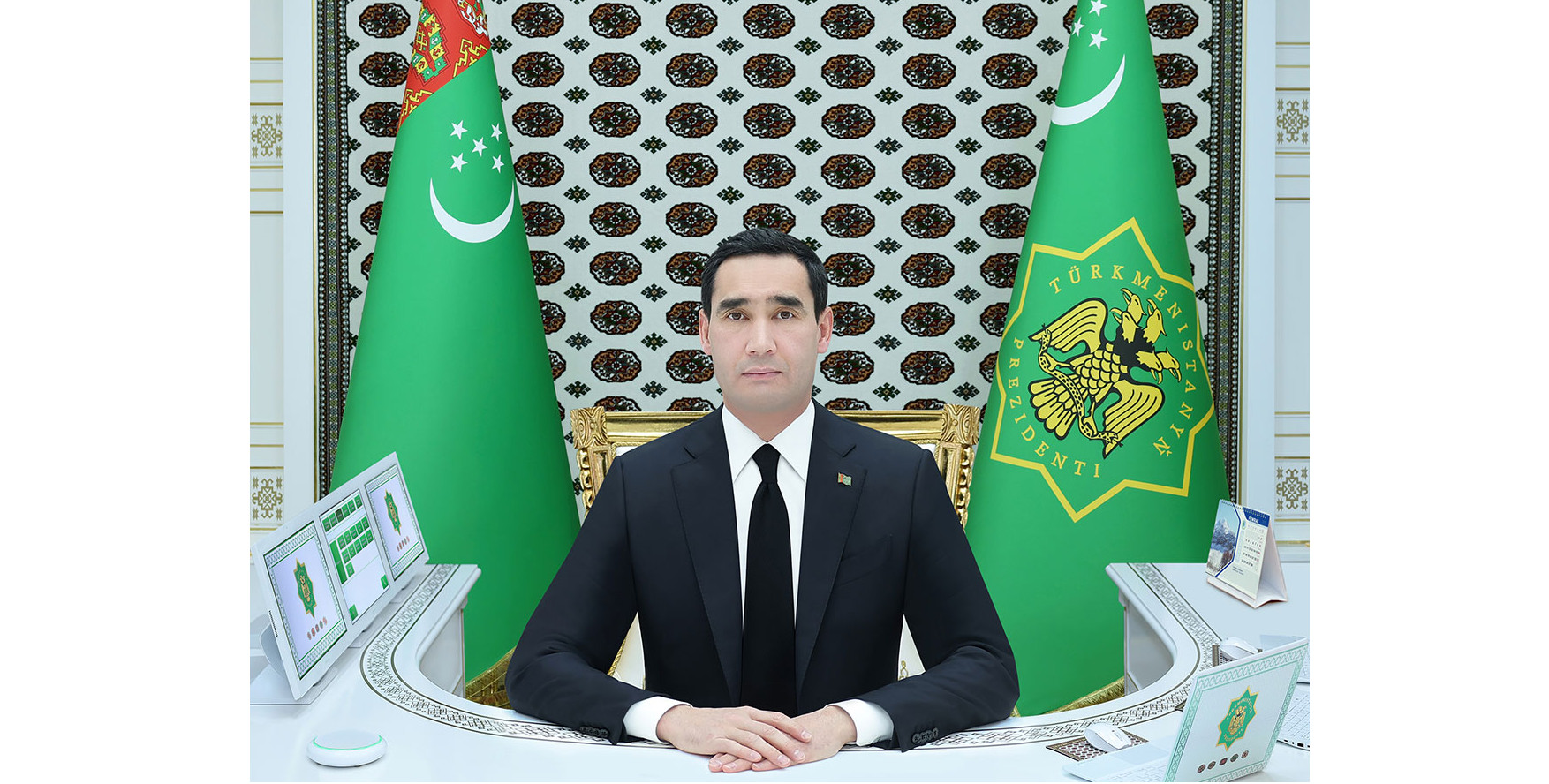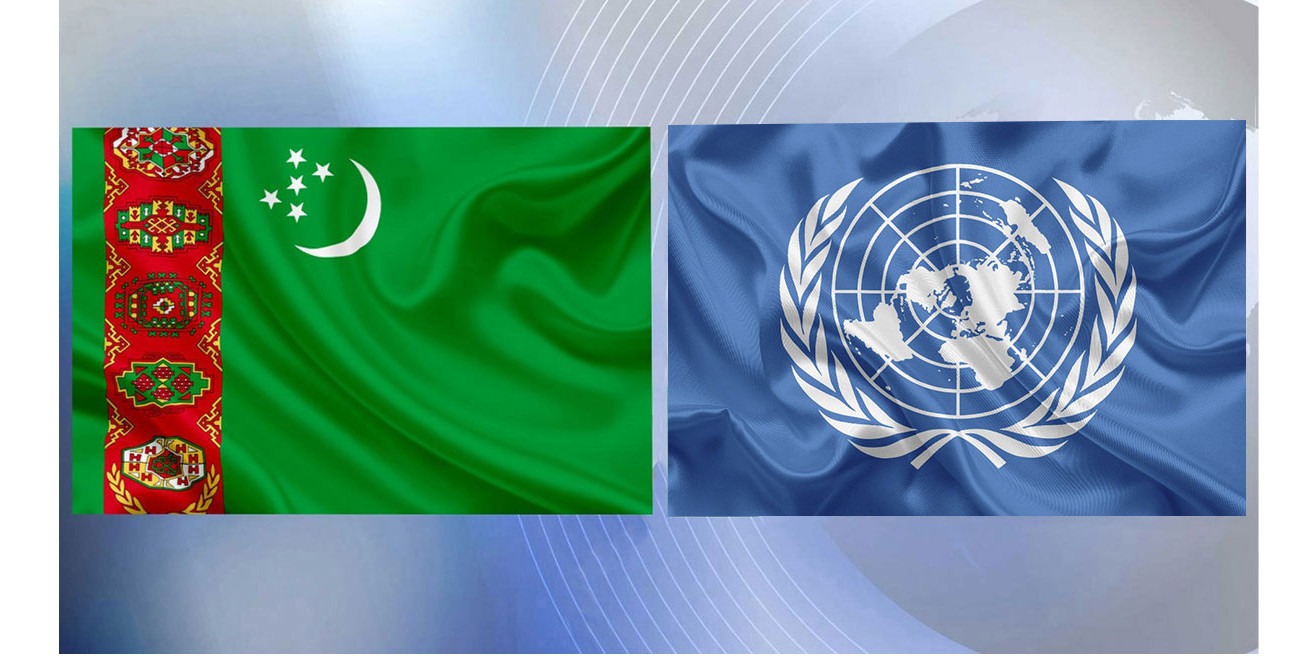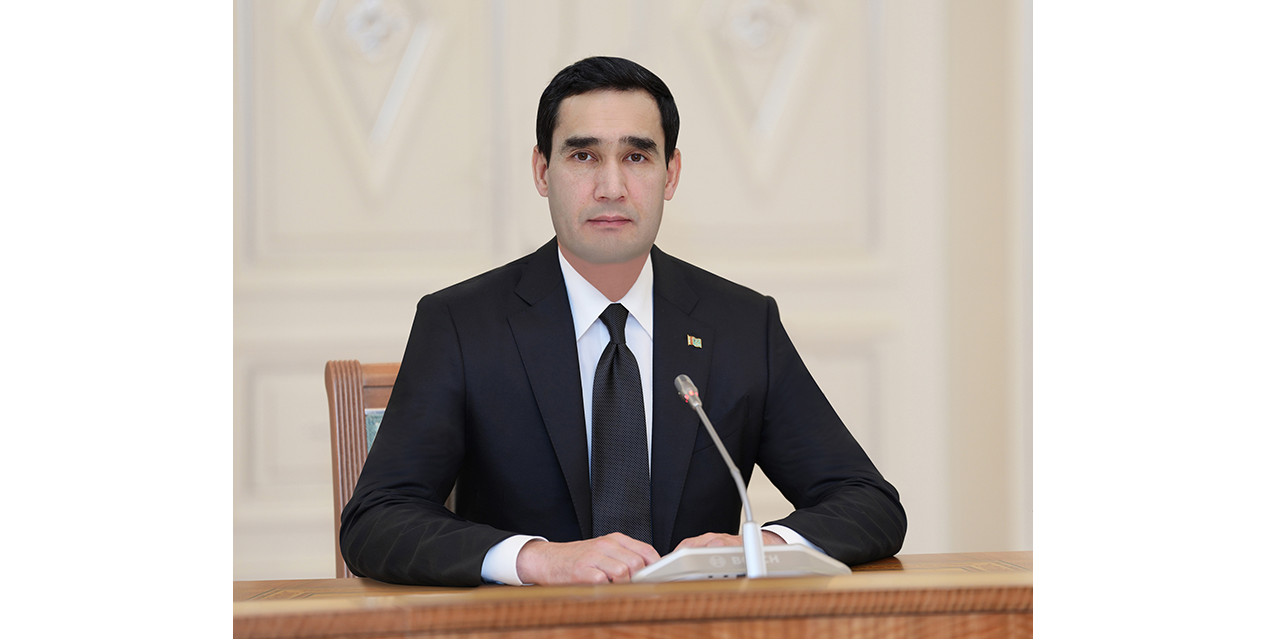
An important event of international importance – Conference of Ministers of Transport of Landlocked Developing Countries – was held on August 15-16 this year in the Avaza National Tourist Zone. The outcome of the Forum, organized by the Government of Turkmenistan under the auspices of the UN, was the main theme of the briefing held yesterday at the Ministry of Foreign Affairs.
Heads and representatives of diplomatic missions and offices of international organizations accredited in our country, as well as national and foreign media were invited to the meeting.
During the briefing, gratitude was expressed to all states and international organizations whose delegations took an active part in the work of the Conference. As noted, constructive proposals, promising ideas and recommendations made from its rostrum will create the basis for further joint activities to implement the global sustainable transport agenda and consolidate efforts to develop a reliable interregional transport infrastructure.
The main partner in organizing the Forum was the Office of the UN High Representative for the Least Developed Countries, Landlocked Developing Countries and Small Island Developing States. In this regard, sincere gratitude was addressed to colleagues from the United Nations, including the Office of the UN Resident Coordinator in Turkmenistan, for the well-coordinated and fruitful work in preparing and holding this important event.
As emphasized, the transport component is one of the key factors for stable economic development of countries, especially landlocked countries (LLDCs), as well as the further expansion of the entire spectrum of interstate relations on a regional and international scale. However, in order to form effective transport systems, along with efforts at the national level, coordinated multilateral interaction is needed to build sustainable chains, create and develop transport and transit corridors. During the period of post-COVID recovery, this topic takes on special significance.
These issues were discussed during the Forum held on the Turkmen coast of the Caspian Sea, namely: the development of transport infrastructure, the optimization of customs and migration procedures, the acceleration of investment flows in the global transport sector, the improvement of environmental friendliness and safety of transportation, the creation of favorable conditions for increasing the intensity and efficiency of transport communications.
All these are the elements of the Ashgabat process laid down in 2016 as an essential and integral part of the global agenda in this area. Its main goal is to ensure the logic and consistency of further cooperation in the field of global transport and logistics, to form a close public-private partnership, to assert the legitimate interests of landlocked countries, and to specify the tasks of multilateral cooperation in this direction.
In this context, the importance of the First Global Conference on Sustainable Transport held in the Turkmen capital in November 2016 was noted. It launched a new stage of transport cooperation, which included and significantly developed the UN specialized agencies, in particular, its regional economic commissions, interregional organizations, national governments. As part of the implementation of the Ashgabat process, dozens of reports and publications have been published, which, in fact, reflect the real state of affairs in the vast geo-economic space in the field of transport, transit and logistics.
The Ashgabat process also gave a powerful impetus to the development of the transport sector and logistics activities in Turkmenistan. In this aspect, the growth rates of the private sector are noteworthy, where more than 100 transport and logistics companies have been created and are currently actively operating.
The Ministerial Transport Conference held in Avaza continues the Ashgabat process, strengthens and develops its intensity in the interests of countries located in regions geographically remote from the oceans. The high relevance of the agenda of the Forum, held in a hybrid format, is clearly evidenced by the solid composition of its participants, representing various regions of Asia, Africa, Middle East, Europe and Latin America, as well as authoritative international organizations.
With regard to the information support of the Conference, it was emphasized that all plenary sessions were broadcast live on the United Nations web platform. The work of the Forum was widely covered by international media.
Within the framework of the sessions of the Conference, issues of cooperation in such areas as the current state of air, road, rail and sea transport, prospects for the development of the transport and logistics segment of the world economy, attracting investment in industry infrastructure, introducing innovations, the main aspects of environmental protection and security on transport have been considered.
In addition, the Forum has become an open platform for negotiations in bilateral and multilateral formats. Several dozen meetings were organized, which became a good opportunity not only to strengthen partnership in the transport and communications sector, but also to promote interstate political dialogue, interaction in economic and humanitarian areas.
On the sidelines of the Conference, a number of documents were signed to strengthen the legal framework for cooperation. Among them: Memorandum of Understanding of the 2nd meeting of the Coordinating Council for the creation of an international transport corridor (Ashgabat agreement); Agreement between the Government of Turkmenistan and the Government of the Republic of Moldova on international road transport; Memorandum of Understanding between the Agency for Transport and Communications under the Cabinet of Ministers of Turkmenistan and the Ministry of Transport of Russian Federation; Memorandum of Understanding between Türkmendiňizderýaýollary Agency of the Transport and Communications Agency under the Cabinet of Ministers of Turkmenistan and the Maritime Transport Agency of Georgia.
In addition, foreign guests who arrived at the Forum were given the opportunity to visit the Turkmenbashi International Airport and the Turkmenbashi International Seaport, where specialized exhibitions were launched. A thematic multimedia exposition was organized at the Avaza Congress Center.
It was also noted that two side events were held within the framework of the Conference. Thus, on August 16, the 2nd meeting of the Coordinating Council of the countries participating in the Ashgabat Agreement was held. Currently, interest in this Agreement is growing. The potential here is huge, both in terms of additional economic opportunities, and from the cultural and historical perspective of restoring ancient transport links with the countries of the Middle East.
During the meeting, significant aspects of the further practical implementation of the Ashgabat Agreement were discussed, an agreement was reached to hold a high-level meeting in the near future to consider practical issues of increasing cargo transportation, simplifying visa and customs procedures. As a result, the above-mentioned Memorandum was signed.
The Conference venue also became the venue for the First Meeting of Ministers of Transport in such a promising and potentially demanded format of multilateral cooperation as “Central Asia - Middle East – Africa”.
At the same time, on August 17, the ceremony of launching the Pilot Project of the Global Transit Document took place. This document is a universal digital solution in the development of multimodal transportation, is the result of the interaction of the Intergovernmental Commission of the International Transport Corridor “Europe-Caucasus-Asia” (TRACECA), the International Center for Transport Diplomacy, the CIS Intergovernmental Council of Road Builders, the world's largest developers of IT technologies, as well as countries that have expressed interest in piloting an electronic transit document.
During the briefing, special emphasis was placed on the initiatives put forward by President Serdar Berdimuhamedov, who delivered a video message to the Conference participants. The head of state reaffirmed the position of Turkmenistan on the need to fix transport issues on a permanent basis in the global agenda of the United Nations as a separate area of its activity, to give the dialogue on these issues a systemic and consistent character.
As you know, our country is the initiator of the First Global Conference on Sustainable Transport. At the suggestion of Turkmenistan, the UN General Assembly in 2014, 2015, 2017 and 2021 adopted resolutions key to the development of multilateral transport cooperation.
In his speech, President Serdar Berdimuhamedov, emphasizing that our country does not intend to reduce the dynamics of proactive participation in the global transport dialogue, confirmed Turkmenistan's focus on its intensification and expansion, saturation with new specific projects and plans. Important proposals were made in this regard. One of them is the creation of a special working group in the UN, which would purposefully defend the interests of LLDCs in the transport sector and conduct systematic work with the relevant structures of the Community of Nations for this purpose. The second initiative concerns the preparation of a draft resolution of the UN General Assembly “On enhancing the role of landlocked developing countries in the development and strengthening of global transport cooperation.”
Turkmenistan is starting to implement the ideas expressed by the head of state. Counting on the active participation of all interested partners in this process, our country is open to any constructive proposals and recommendations.
In this context, it was emphasized that the initiatives of the President of Turkmenistan directly correlated with the content of the speeches and discussions held during the ministerial segment and thematic sessions of the Forum. Of particular importance is the reflection of these positions in the adopted Final Statement of the Conference, which defines the main directions for further multilateral transport cooperation at the UN site.
These include: consolidating international efforts to achieve the specific goals of the Vienna Program of Action for LLDCs, as well as the SDGs that are directly related to transport and communications sector; increase in investment flows and financing for the development of global transport infrastructure. Another activity in the priority areas is joint development of transport and transit corridors, integrated multimodal transport systems and minimization of barriers in the field of interregional trade; accelerating digitalization processes to improve transit and simplify trade procedures; increasing the environmental sustainability and reliability of transport systems, adapting to climate change and mitigating its consequences in this area.
The importance of the fact that the results of the Ministerial Forum at NTZ “Avaza” lay the foundation for the development of the Ashgabat process during the upcoming third United Nations Conference on Landlocked Countries in 2024 was especially emphasized. At the same time, the readiness of Turkmenistan to continue to actively promote multilateral cooperation on issues of the global transport agenda was confirmed.
During the briefing, the floor was given to the UN Resident Coordinator in our country, Dmitry Shlapachenko, who expressed sincere gratitude to the President and the Government of Turkmenistan for the high organizational level of the Conference, noting the priority nature of the issues discussed at it.
As emphasized, transport connectivity is an integral part of achieving the Sustainable Development Goals, regional and global economic integration, and ensuring access to international markets. This is especially the case for the least developed countries, landlocked developing countries and small island states. Therefore, the idea of Turkmenistan to hold this Conference is very timely and useful.
The results of the Forum will be an effective contribution to the preparations for the third UN Conference on Landlocked Countries scheduled for 2024. In this aspect, it was noted that the Central Asian region has great potential and prospects in the transit and transport sector. At the same time, it was emphasized that cooperation with Turkmenistan is a strategically important direction for the United Nations.
The leaders and representatives of the diplomatic missions accredited in our country, who spoke at the briefing, also expressed sincere congratulations to the President and the Government of Turkmenistan on successful holding of the international ministerial conference. As noted, the importance and relevance of the Forum, held at NTZ Avaza, can hardly be overestimated, since dynamic socio-economic development in the national, regional and global dimensions requires the improvement and diversification of transport and logistics infrastructure.
In this context, the Conference provided an opportunity for an interested discussion and exchange of views on topical issues of strengthening and expanding the transport interconnectivity of developing countries that do not have access to the sea, harmonizing all relevant procedures, forming new transit corridors, intensifying investment activities, and effectively introducing digital technologies into international cargo transportation. technologies, on other primary aspects of transport issues.
In this regard, support was expressed for the constructive initiatives of the President of Turkmenistan Serdar Berdimuhamedov, providing a new targeted contribution of our country to the process of global cooperation in the field of transport and communications, the promotion of mutually beneficial partnerships in this strategic sector, and the realization of its huge potential for universal sustainable development.







